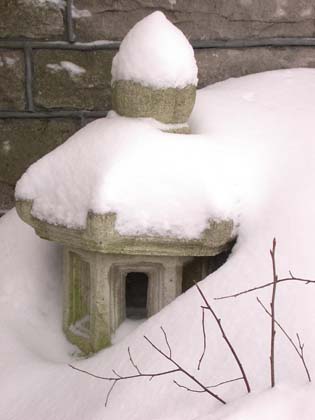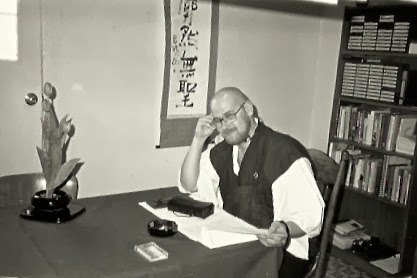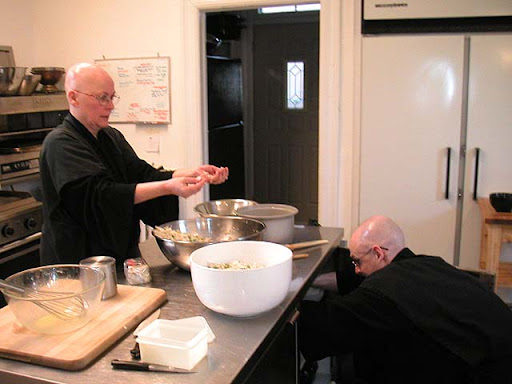
Winter 1996, Dainen-ji

Winter 1996, Dainen-ji
eMirror Vol 27, No. 8
Friday, February 24th, 2023
Edited by the Practice Council
The White Wind Zen Community:
An international community practising and teaching Dogen’s Zen since 1985.
Of course, a flower is actually another kind of worm, really, it’s this long tube and it is all about taking other things into itself, digesting them, and then getting rid of whatever is left. But that’s okay because there is nothing wrong with being a worm. A worm does what a worm does. It goes, clack, clack. It clacks its little teeth, munches things down, and it spits them out the other end a little while later. And that’s okay.
But the worm can be messy or it can be tidy. A tidy worm begins to realize that it can do things outside of worm world, outside of just the motive of consumption. It can do what it does with a quality of dignity and grace. Somehow, even if it does the same things that it always does, eating something and then spitting it out the other end, there is a different quality to how it does what it does. Something very inspirational begins to occur, some sort of sense of vision of something larger, and yet something that doesn’t try to get away from or deny being a worm. Perhaps it is the untapped potential of wormhood. There are naturally qualities of dignity and grace, of compassion and clarity because the worm contains within itself, just in its very functioning, just in its very structure, the mechanism of the world that it lives in, the functioning of the world that it lives in, the elements of the world that it lives in.
It is very important for us to relate to the earth, water, fire, air and space, of the worm and of the earth in order for wormhood to flower into something a little larger. So this is why the Buddha goes on and on about faeces and pus and things like that, all kinds of messy things that the worm likes to keep hidden inside the carriage, underneath the skin and bone.
-Ven Anzan Hoshin roshi, continuing Teisho Three: "The Worm" in the series "Flowers and Worms", Hanamatsuri sesshin, April 11th to 14th, 1991, Zazen-ji.
Fusatsu: March 8th and 22nd.
Introduction to Zen Workshop Ottawa
The next Introduction to Zen Workshop will take place on Saturday, March 4th, at 1:45 p.m. To register: https://IntroductionToZenWorkshop.eventbrite.ca; for more information please see https://wwzc.org/introduction-zen-workshop-ottawa
March Two-day Sesshin:
The March two-day sesshin will begin at 8:00 p.m. on Friday, March 10th and will end at 6:00 p.m. on Sunday, March 12th.
Keizan-ki
March 21st is the memorial for Keizan Jokin zenji.
Hermitage:
The Roshi is continuing an extended period of "self-isolation" due to underlying health issues until the COVID-19 situation clarifies.
Long Distance Training Program:
For students living an hour or more commuting distance from the monastery in Ottawa, please visit this Web Page: https://wwzc.org/long-distance-training-program
“River of Memory”: transcript of teisho presented by Ven. Anzan Hoshin roshi at Zazen-ji, on March 21st, 1991:
https://wwzc.org/dharma-text/river-memory
Ian Richard sat a two day retreat on Saturday, February 18th and Sunday, February 19th at his home in Ottawa. Ontario.
If you are a student of Ven. Anzan Hoshin roshi and would like to sit a retreat at Dainen-ji,, please email schedule@wwzc.org to register a week in advance. For further information please visit this page: https://wwzc.org/retreats
If you would like to sit a retreat at home please follow the schedule outlined in this page:
https://wwzc.org/retreat-schedule-public-students. After your retreat, please send an email to schedule@wwzc.org to confirm that you sat a retreat and include the duration and location.
Saturday, February 25th to Saturday, March 4th
Saturday, February 25th: "The Landscape of Reality" by Ven. Anzan Hoshin roshi: "Knowing Not-Knowing" (11 of 12, 35 minutes)
Sunday, February 26th: "SAkN: Presencing the Open Body" by Ven. Anzan Hoshin roshi: "Opening Past Everything" (teisho 5 of 5)
Monday, February 27th: "The Touchstone" by Ven. Jinmyo Renge sensei: "The Touchstone 16, Manjusri" (teisho 16 of 22, 18 minutes)
Thursday, March 2nd: "The Touchstone" by Ven. Jinmyo Renge sensei: "The Touchstone 16, Manjusri" (teisho 16 of 22, 18 minutes)
Saturday, March 4th: "The Landscape of Reality" by Ven. Anzan Hoshin roshi: "The Last Piece" (12 of 12, 35 minutes)
Associate and general students should continue to follow the recorded Teachings schedule for the sitting you were attending at the monastery, and listen to that during your home practice.
You can access the online Recorded Teachings Library at wwzc.org/recorded-teachings-schedule.
You can also use the streaming site at app.wwzc.org to live stream recordings from the online Library. If you have forgotten your password or need assistance with accessing the recorded Teachings, please email schedule@wwzc.org.
Please note that teisho should be listened to in the correct order and with none missed out as themes, metaphors, questions raised and answered evolve in spirals throughout the series.
While most of the online Recorded Teachings library is password-protected and only accessible to students of the Lineage of Zen Master Anzan Hoshin, a small selection of MP3 recordings of teisho are accessible to the public at wwzc.org/recorded-teachings Additional recordings will be uploaded periodically. MP3 recordings of four recorded teisho by Ven. Anzan Hoshin roshi are currently available:
Dharma Position https://wwzc.org/dharma-position
Eyes See, Ears Hear https://wwzc.org/eyes-see-ears-hear
Embarrassment https://wwzc.org/embarrassment
Ven. Anzan Hoshin roshi's reading of his translation of Eihei Dogen zenji's “Bendowa: A Talk on Exerting the Way”: https://wwzc.org/bendowa-talk-exerting-way

Photograph of Ven. Anzan Hoshin roshi at Daijozan, mid-1980s,
by Ven. Shikai Zuiko sensei
Ven. Anzan Hoshin roshi has recently completed translation work on some shorter texts by Eihei Dogen zenji from the Shobogenzo. The work on these particular texts is based upon the literal translations that he worked on with Joshu Dainen roshi at Hakukaze-ji around 1977-78 followed by many years of putting them down, picking them up, and polishing. Naturally, more essential texts such as Uji, Genjokoan, Shinjin Gakudo and some 40 others were completed first and have been given extensive commentaries by the Roshi. This batch of texts includes Baike: Plum Blossoms, Ryugin: Howling Dragon, and Udonge: The Udumbara Blossoming and many others are nearing completion. Annotation details and successfully conveying them across various document formats are the issue at this point.
Work on Bussho: Buddha Nature, a very long and nuanced text by Dogen zenji, is ongoing.
Roshi is also finishing an update to the Saijo Shingi: The Deportment of Radiance, our manual of monastic training standards which is a supplement to the ancient Eihei Shingi and Keizan Shingi.
Begun by Ven. Shikai Zuiko o-sensei
Finished by Ven. Fushin Comeau shuso following her death

Udumbara (S): a mythological flower which is said to bloom only once in three thousand years, signalling the arrival of a Buddha or world Teacher
Posted February 24th, 2023. New entries are posted every two weeks.

Photograph by the late Shikai Zuiko osho
Dogen zenji taught in the Tenzo Kyokun: Instructions for the Tenzo (https://wwzc.org/dharma-text/tenzo-kyokun-instructions-tenzo) that the work of preparing and serving meals is "a matter for realized monks who have the mind of the Way “, or by senior disciples who have roused the Way-seeking mind." In alignment with this, part of Zen Master Anzan Hoshin's samu for the Community involves personally overseeing the activities of the ancient Office of Tenzo. Ven. Jinmyo Renge sensei serves as Tenzo and Mishin godo and Saigyo ino offer assistance as tenzo-anja. The following meals were prepared on Monday, Tuesday and Thursday evenings.
Monday Yakuseki:
White and brown Thai jasmine rice; stir fried chopped yellow cooking onion, poblano and red bell peppers, deep fried tofu, chopped kimchi, chile garlic paste, black bean paste, shoyu, salt, black pepper, sesame oil; soup (mushroom broth, slivered ginger, sauteed cremini mushrooms, long strips of Shanghai bok choy, silken tofu).
Tuesday Yakuseki:
Mixed grain (Arborio rice, Thai white and brown rice, Basmati white and brown rice, seasoned with the liquid from cooked, strained, minced garlic, ginger, leeks and scallions cooked in vegetable stock); miso shiru with cubed silken tofu and pea shoots (kombu, shiro miso, shitake mushrooms, slivered ginger, mushroom stock, shoyu, and lime juice); takuan and ginger.
For those who wished to supplement their diet with meat, roasted chicken thighs seasoned with a dry rub).
Thursday Yakuseki:
White and brown basmati rice; paneer Makhani (diced paneer, red onion, green chillies, ginger, garlic, cinnamon, black pepper, tomatoes, cumin, coriander, turmeric, kashmiri chili powder, fenugreek, garam masala, cream, fresh coriander leaves); red lentil pancakes (red lentils blended with water and salt, some contained curry seasonings, served with butter); Napa cabbage salad (thinly sliced Napa cabbage, white onion, julienned carrots) with a dressing of mayonnaise, dijon mustard, apple cider vinegar, black pepper, honey, popped black mustard seeds and cumin.

If you would like to thank someone for a contribution they have made, please feel free to send an email to Jinmyo sensei at rengezo@gmail dot com, but be sure to type "eMirror” in the subject line.
From Mishin godo:
Thank you to the Roshi for dokusan during the O-Sesshin and for the vast body of Dharma he has presented that students now and in the future benefit from. Thank you to Jinmyo sensei for providing email instruction to a large number of public students while also leading the Nehan O-Sesshin, doing dokusan with monks and formal students, and preparing excellent O-sesshin meals. Thank you to Saigyo ino for keeping track of and organizing samu assignments throughout the O-sesshin. Thank you to Fushin shuso for producing the first iteration of a database app to use for sitting attendance. Thank you to Leonardo Nobrega for keeping on top of laundering monastery cleaning cloths, dish towels and cloths. Thank you to David Gallant for looking after selling old WWZC monitors on Kijiji.
From Leonardo Nobrega:
Thank you to Jinmyo sensei for dokusan during the Nehan O-sesshin; to the Office of the Tenzo for O-sesshin meals; to the monks and formal students for our efforts together in practising during the O-sesshin.
From David Gallant:
Thank you to Jinmyo sensei for preparing very nice Indian cuisine for residents dinner on Thursday evening this week. Thank you to Saigyo ino for organizing the upcoming March Samu Weekend.
From Julien Jefferson:
Thank you to Jinmyo sensei for two thorough and helpful emails. Thank you to Saigyo ino for meeting me in a telephone practice interview.
|